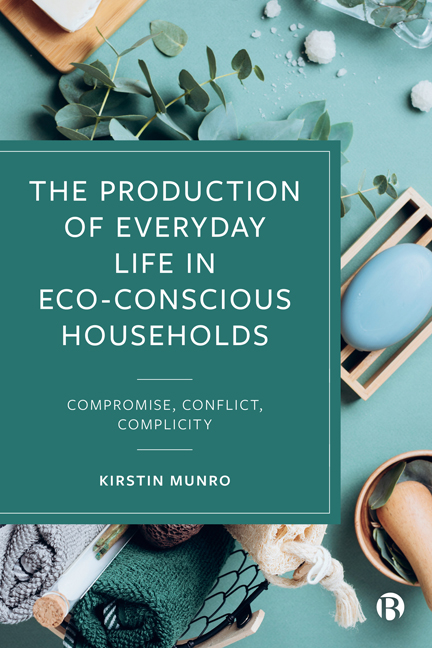Book contents
- Frontmatter
- Dedication
- Contents
- Acknowledgments
- 1 Introduction: “This Can’t Be All Up to Me”
- 2 Eco-Conscious Household Production and Capitalist Society
- 3 Priorities in Eco-Conscious Households
- 4 Resources and Constraints in Eco-Conscious Households
- 5 Managing Household Waste
- 6 Cleanliness and Comfort
- 7 Doing Their Own Research
- 8 Conflict
- 9 “How Do We Live with Ourselves?”
- 10 Conclusion: “We Have Met the Enemy and He Is Us”
- Notes
- Index
4 - Resources and Constraints in Eco-Conscious Households
Published online by Cambridge University Press: 18 January 2024
- Frontmatter
- Dedication
- Contents
- Acknowledgments
- 1 Introduction: “This Can’t Be All Up to Me”
- 2 Eco-Conscious Household Production and Capitalist Society
- 3 Priorities in Eco-Conscious Households
- 4 Resources and Constraints in Eco-Conscious Households
- 5 Managing Household Waste
- 6 Cleanliness and Comfort
- 7 Doing Their Own Research
- 8 Conflict
- 9 “How Do We Live with Ourselves?”
- 10 Conclusion: “We Have Met the Enemy and He Is Us”
- Notes
- Index
Summary
In this chapter, I will tell you about the resources available to my informants as they go about getting things done in everyday life, as well as the factors that constrain their ability to get things done and the options available to them.
Households draw upon a variety of resources to get things done in everyday life, but these resources can be simplified to three major overlapping categories: money, time, and know-how. Money is used to buy items the household uses or transforms, pay for assistance, and to pay for education and training. Money is obtained through government assistance, trading an adult's time for wages or self-employment income, and directly (cash) or indirectly (gifts) from extended family members. Time is used to transform purchased inputs into usable final-use goods and services, to locate free or cheaper items, to obtain money through waged work, and to obtain know-how. Time can come from household adults or extended family and friends. Know-how (in other words, competence in theories of social practice or human capital in economics) includes the skills that allow household members to produce usable goods and services in the home, to trade their time for a higher-than-subsistence wage, and to find and understand information about sustainability practices. Obtaining knowhow requires time, and in some cases money.
However, these resources are not limitless. In particular, households describe making decisions on a foundation of limited time and limited money, with time constraints by far the most common concern of my informants. Households are also constrained by social and cultural norms, particularly around cleanliness. Finally, information about sustainability and sustainability practices can be difficult to find, and in some cases accurate information is not available.
Household resources
Resources from waged work
Every household I spoke with had at least one adult who engaged in waged work or self-employment for money, and both adults worked for money in nearly all of the households with two adults. Heather decided on a career as a nurse because she knew the schedule would be compatible with her desire be available for her children during the day, and Emily's hours as a consultant are flexible and have allowed her to adjust her schedule to accommodate childcare obligations during her children's different life stages.
- Type
- Chapter
- Information
- The Production of Everyday Life in Eco-Conscious HouseholdsCompromise, Conflict, Complicity, pp. 59 - 78Publisher: Bristol University PressPrint publication year: 2023

